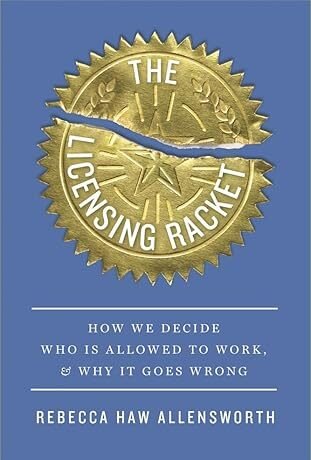I review a very good new book on occupational licensing, The Licensing Racket by Rebecca Haw Allensworth in the WSJ.
Most people will concede that licensing for hair braiders and interior decorators is excessive while licensing for doctors, nurses and lawyers is essential. Hair braiders pose little to no threat to public safety, but subpar doctors, nurses and lawyers can ruin lives. To Ms. Allensworth’s credit, she asks for evidence. Does occupational licensing protect consumers? The author focuses on the professional board, the forgotten institution of occupational licensing.
Governments enact occupational-licensing laws but rarely handle regulation directly—there’s no Bureau of Hair Braiding. Instead, interpretation and enforcement are delegated to licensing boards, typically dominated by members of the profession. Occupational licensing is self-regulation. The outcome is predictable: Driven by self-interest, professional identity and culture, these boards consistently favor their own members over consumers.
Ms. Allensworth conducted exhaustive research for “The Licensing Racket,” spending hundreds of hours attending board meetings—often as the only nonboard member present. At the Tennessee board of alarm-system contractors, most of the complaints come from consumers who report the sort of issues that licensing is meant to prevent: poor installation, code violations, high-pressure sales tactics and exploitation of the elderly. But the board dismisses most of these complaints against its own members, and is far more aggressive in disciplining unlicensed handymen who occasionally install alarm systems. As Ms. Allensworth notes, “the board was ten times more likely to take action in a case alleging unlicensed practice than one complaining about service quality or safety.”
She finds similar patterns among boards that regulate auctioneers, cosmetologists and barbers. Enforcement efforts tend to protect turf more than consumers. Consumers care about bad service, not about who is licensed, so take a guess who complains about unlicensed practitioners? Licensed practitioners. According to Ms. Allensworth, it was these competitor-initiated cases, “not consumer complaints alleging fraud, predatory sales tactics, and graft,” where boards gave the stiffest penalties.
You might hope that boards that oversee nurses and doctors would prioritize patient safety, but Ms. Allensworth’s findings show otherwise. She documents a disturbing pattern of boards that have ignored or forgiven egregious misconduct, including nurses and physicians extorting sex for prescriptions, running pill mills, assaulting patients under anesthesia and operating while intoxicated.
Read the whole thing.
The post The Licensing Racket appeared first on Marginal REVOLUTION.













